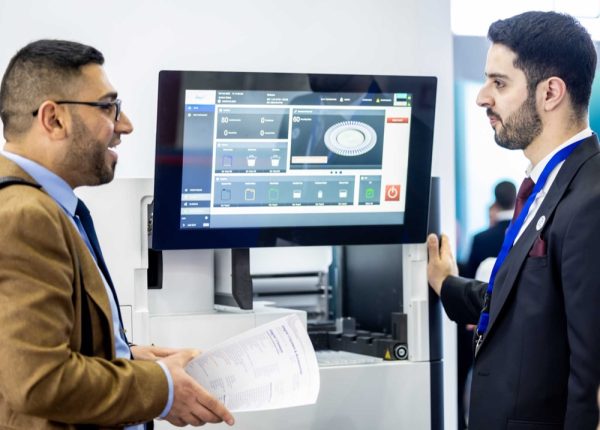Dubai, United Arab Emirates
- Experts from around the world will convene at Medlab Middle East to discuss the impact of Artificial Intelligence (AI) on the laboratory sector
- AI will speed up decision-making and diagnostics, revolutionising healthcare systems
- The global AI in drug discovery market is expected to reach US$24.7 million by 2029
The healthcare industry around the world is increasingly adopting Artificial Intelligence (AI) to accelerate scientific advancements, develop new treatments and improve health outcomes across a diverse spectrum of health conditions. Medlab Middle East is poised to delve into the pivotal role of AI in laboratories when global experts gather at the event from 5-8 February at the Dubai World Trade Centre.
The use of AI in medical imaging is gaining traction across the UAE, supported by a number of government initiatives and policies. Several healthcare organisations in Dubai are successfully using AI-based medical imaging technology, and the Abu Dhabi Health Services Company (SEHA) has adopted AI-based medical imaging technology for the automated detection of breast cancer and lung diseases. In October, Saudi Arabia announced the country’s first AI-powered eye screening tests which can provide accurate diagnoses of diabetic retinopathy, simplify screening and save time and costs.
AI is also helping to speed up the discovery of new medicines, a process which typically involves the testing of various chemical compounds – of which there can be millions. AI will perform trial and error within a computer and come up with the best combination for the drug. According to Data Bridge Market Research, the global AI in drug discovery market is expected to reach US$24.7 million by 2029, growing at a rate of 53.3 per cent annually.

Professor Hassan Ugail, Director of the Centre for Visual Computing and Intelligent Systems at the University of Bradford in the UK, will be speaking at Medlab Midde East as part of the ‘Digitalisation, Automation and Innovation’ session, on the second day of the NextGen Conference. Professor Ugail has led the development of a pioneering AI tool called “OrQA” (Organ Quality Assessment), which assesses the quality of human organs for transplantation.
When it comes to evaluating organs for transplantation, time is a critical factor, and OrQA can provide detailed and reliable analysis in a matter of seconds. The AI method uses a scoring system to grade an organ between zero and five, with organs that score below four, being suitable for use.
Professor Ugail explains, “We use state-of-the-art artificial intelligence techniques to train a machine learning algorithm and worked with a number of surgeons to ‘score’ a range of organs. The machine then learns about the scores, alongside other characteristics such as the colour, texture and shape of the organ.”
He adds, “Traditionally when an organ becomes available for transplantation, you need to gather experts as quickly as possible for an assessment. With OrQA, an image of that organ can be uploaded and it will quickly provide a score. It is an excellent application of AI for real healthcare use and helps surgeons to make the best possible decisions in the quickest possible time.”
Funded by the UK’s National Institute for Health and Care Research (NIHR), the £1.2 million project is a collaboration between the University of Bradford, Newcastle University and the University of Oxford and could result in an additional 200 patients receiving life-saving kidney transplants and 100 more liver transplants per year, potentially saving millions of pounds for the UK National Health Service (NHS). There are plans to take the tool worldwide in the coming year.
In October 2023, the UAE announced the launch of its first Centre for Excellence (COE) for artificial intelligence. One of the services provided by the COE is an organ donation and transplant centre. This facility helps to match donors and patients by analysing test results, which helps to facilitate organ transplants and prioritise critical cases within and outside the country. Additionally, AI technology will be used to analyse the results of radiological scans, which is expected to increase the efficiency of diagnoses. The Centre is set to launch an AI lab in the coming weeks.
Tom Coleman, Exhibition Director, Informa Markets Healthcare concludes, “The integration of AI into laboratory practices is already redefining the landscape of scientific discovery and driving innovation in healthcare. In the years to come, the need for AI in medical imaging will continue to grow.”
“AI technologies are able to process and analyse data more quickly and accurately leading to new insights in various realms of study, and we are excited to spotlight this exciting field of healthcare at Medlab Middle East.”
The 23rd edition of Medlab Middle East will focus on revolutionising laboratory medicine and showcasing sustainable solutions. Next Generation medicine will be explored at the exhibition as part of a new show vertical in partnership with Express Med Diagnostics and Research. Product categories featured across the show floor include technology, innovation, general services, imaging, infrastructure, IT, laboratory, medical equipment, pharma and nutrition.






















